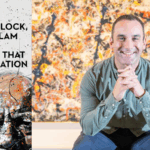The world has been broken for a long time—arguably since the beginning of time—but doesn’t it feel particularly fractured right now? Social media and 24-hour news cycles make it nearly impossible for our nervous systems to catch a break. Injustices and tragedies, real and serious, bombard us and before we can fully grasp one crisis, another erupts.
This relentless barrage can leave us in a state of overwhelm, where the brokenness of the world becomes our constant companion. As David wrote in Psalm 139, God is always with us, no matter where we go. But amid chaos, we may unintentionally let our focus shift away from God’s presence to the unending cycle of problems around us. We rewrite David’s words in our minds: Where can I go from your problems? Where can I flee from the issues? If I go to social media, you are there; if I turn on cable news, you are there.
In our attempts to manage this overwhelm, we often fall into one of two traps. Some of us default to outrage. While outrage can be justified, it often spirals into self-righteousness. It feels satisfying in the moment, but it rarely leads to change. Instead, it risks reducing people to caricatures—faceless villains we feel justified in treating without compassion or nuance.
Others cope by retreating into ignorance. Like the man in the Parable of the Good Samaritan who asked Jesus, “And who is my neighbour?” (Luke 10:29), they prefer to avoid engaging with the need in front of them. Both responses—outrage and avoidance—are what might be called “attempted solutions.” Neither change much, and in many cases, they worsen the problem.
There is, however, another way forward, and the Advent season offers a compelling invitation to walk it.
Advent Is A Reminder of Hope and Local Impact
When we think of Advent, the word anticipation often comes to mind. This season reminds us of the hope embodied in Jesus—the already and the not yet. John 1:5 beautifully encapsulates this: “The light shines in the darkness, and the darkness has not overcome it.”
But Advent also serves as a reminder that the gospel is deeply local. Jesus was born into a specific place, a community marked by systemic injustice and hardship.
The world Jesus entered was profoundly broken. Herod’s paranoia cast a shadow over Jerusalem, where the well-being of many was tied to his volatile whims. Rome ruled with an iron fist, balancing its achievements in innovation with oppression, exploitation, and conquest. The region of Jesus’ birth was marginalized, poverty-stricken, and rife with trauma.
Yet, it was in this context—hyperlocal, challenging, and imperfect—that Jesus began his ministry. His work in that specific place sparked a kingdom movement that continues to spread today.
A Hyperlocal Gospel
Jesus came to save the world, but he focused his earthly ministry on his immediate surroundings. His interactions—healing the sick, feeding the hungry, teaching the crowds—were tangible and local. This focus provides us with a model for navigating today’s overwhelm.
When we focus on our local communities, we often find evidence of God’s goodness at work. In my own church, we’ve chosen to concentrate our efforts on two pressing issues: care for foster and adopted children and affordable housing. These challenges are complex and require long-term commitment, but by staying focused, we’ve seen progress.
Other churches prioritize different areas, such as supporting prisoners, assisting survivors of domestic violence, or working with unhoused individuals. While we aim to help anyone who walks through our doors, having a clear focus allows us to move the needle on specific systemic issues in meaningful ways.
The local focus doesn’t mean ignoring global issues. When we engage in international missions, we collaborate with those already living and working in the area, joining in the ongoing work of God there. Whether at home or abroad, the principle remains the same: meaningful change happens when we invest in the people and places directly in front of us.
From Outrage to Action
Outrage on social media won’t feed a hungry child, rescue a trafficked person, or support a teenager aging out of the foster system. But localized, gospel-rooted efforts can. God uses his global church to address profound needs as we focus on serving those near us.
While some are called to policy work or systemic reform—and we need them—most of us are called to a simpler path: loving the person in front of us.
Learning from Jesus’ Example
The Gospels show that Jesus rarely addressed systemic issues directly. He didn’t confront Herod’s tyranny or Rome’s oppression. Instead, he ministered to individuals within the broken system. He healed, taught, and loved those he encountered. His hyperlocal ministry transformed lives and set the foundation for a kingdom that would transcend borders and generations.
As we enter the Advent season, let’s resist the pull of outrage and despair. Instead, let’s focus on the one who is coming—Jesus—and on the people and needs right in front of us. This approach doesn’t solve every problem, but it aligns us with God’s work in the world and reminds us that light still shines in the darkness.
Focusing on a few tangible efforts in our local communities may not feel as sweeping as tackling every injustice, but it makes a real difference. And that’s exactly how Jesus began: in a specific place, with specific people, in a profoundly broken world.
This Advent, let’s remember that the kingdom of God often starts small, grows locally, and changes the world one life at a time.











